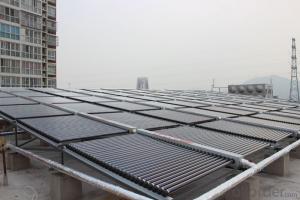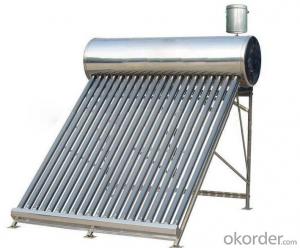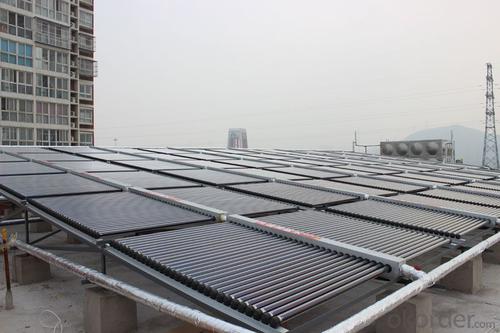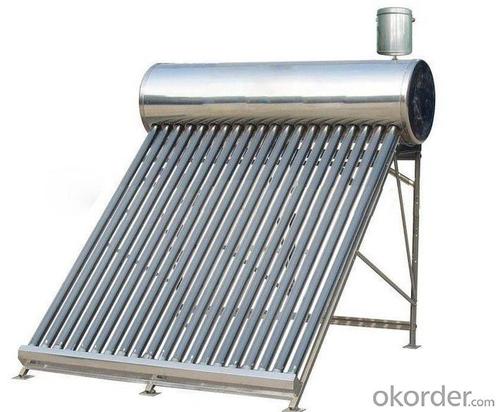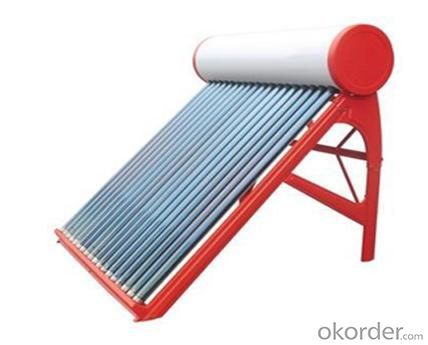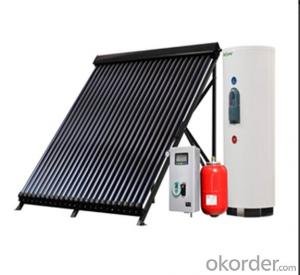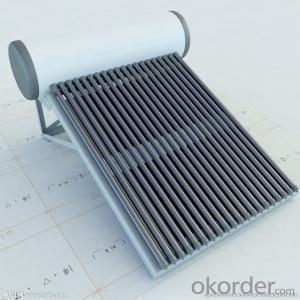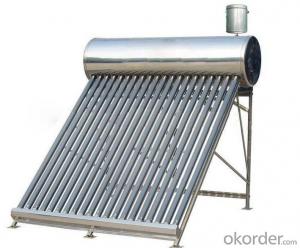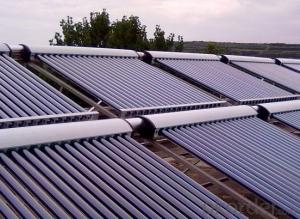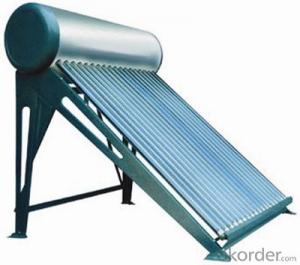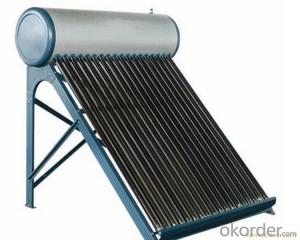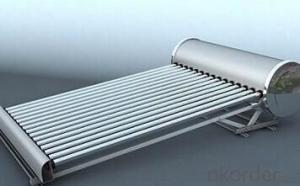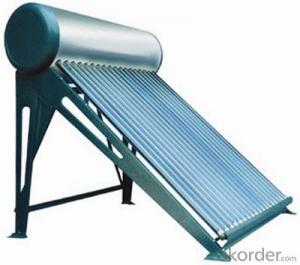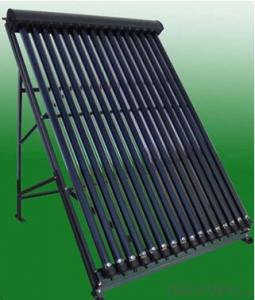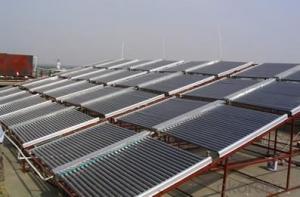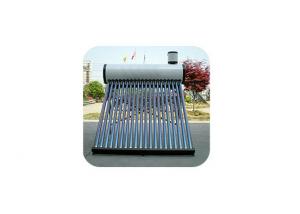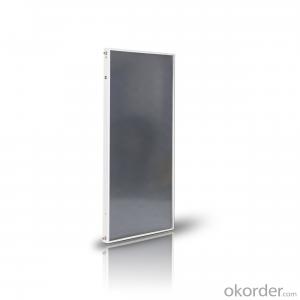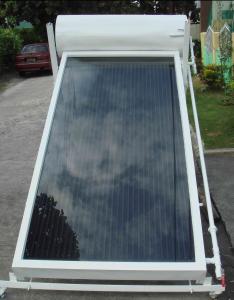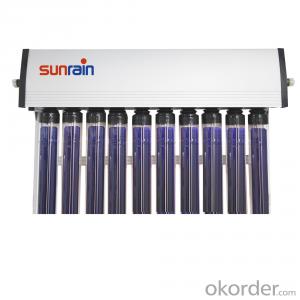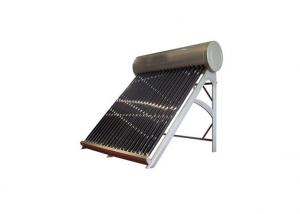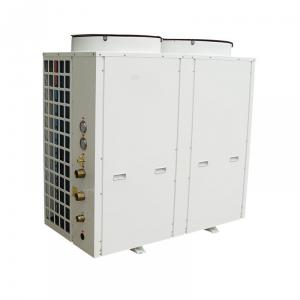150L Passive Solar Water Heater - Stainless Steel Solar Powered
- Loading Port:
- China main port
- Payment Terms:
- TT OR LC
- Min Order Qty:
- 10 set
- Supply Capability:
- 5000 set/month
OKorder Service Pledge
OKorder Financial Service
You Might Also Like
Working Principle of Domestic Solar Water Heaters:
Solar energy, in essence, is an electromagnetic wave, a type of strong optical radiation, which is produced by thermonuclear fusion reaction. The energy of the solar radiation is transmitted through the liught of different wave length. The solar water heater is designed to mainly take in the energy of visible light & near ultra red light through the selective absorbing coating of vacuum tubes.When the water in the solar collector is heated by the solar radiation, its temperature rises. As a result, the water in the solar collector and the water in the tank form natural convection because of density contrast casued by the temperature difference. So the water of the higher temperature is incessantly forced into the insulated solar water tank( As shown in the figure).
Features
<1> Imported SUS304-2B food-level stainless steel,thickness:0.31~0.5mm
<2> Outer tank: High quality stainless steel,thickness:0.31~0.5mm
<3>Insulation: 50~55mm polyurethane foam
<4> Vacuum tube: CU/SS-AL/N red tube
<5> Frame: Stainless steel/Aluminum alloy,thickness:1.2~2mm
<6> Reflector: Stainless steel/Aluminum alloy as option
<7> Available accessories: Feeding tank,solar controller,electric heater, Mag rod,thermostatic mixing valve
Specification
ITEM.NO | SPECIFICATION | EFFECTIVE LIGHT AREA | TANK'S CAPACITY | APPLICATION PEOPLE | CBM | |||
DIAMETER OF WATER TANK | QTY OF TUBE(pcs) | DIAMETER OF TUBE | LENGTH OF TUBE | |||||
Z-NS5810 | 460mm | 10 | 58mm | 1.8m | 1.04 | 100L | 4 | 0.37 |
Z-NS5812 | 460mm | 12 | 58mm | 1.8m | 1.25 | 120L | 4-5 | 0.44 |
Z-NS5815 | 460mm | 15 | 58mm | 1.8m | 1.56 | 150L | 6 | 0.56 |
Z-NS5818 | 460mm | 18 | 58mm | 1.8m | 1.87 | 180L | 7-8 | 0.64 |
Z-NS5820 | 460mm | 20 | 58mm | 1.8m | 2.08 | 200L | 8 | 0.7 |
Z-NS5825 | 460mm | 25 | 58mm | 1.8m | 2.61 | 250L | 10 | 0.89 |
Z-NS5830 | 460mm | 30 | 58mm | 1.8m | 3.13 | 300L | 12 | 1 |
Z-NS5836 | 460mm | 36 | 58mm | 1.8m | 3.75 | 360L | 14-15 | 1.3 |
Z-NS5840 | 460mm | 40 | 58mm | 1.8m | 4.17 | 400L | 16 | 1.4 |
Z-NS5845 | 460mm | 45 | 58mm | 1.8m | 4.69 | 450L | 18 | 1.6 |
Product Details Show:
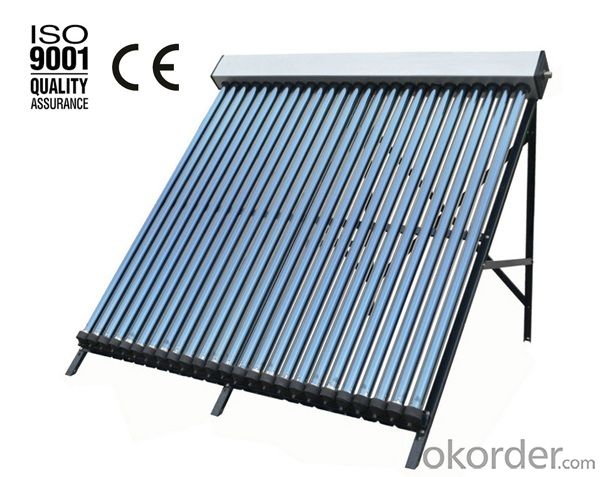
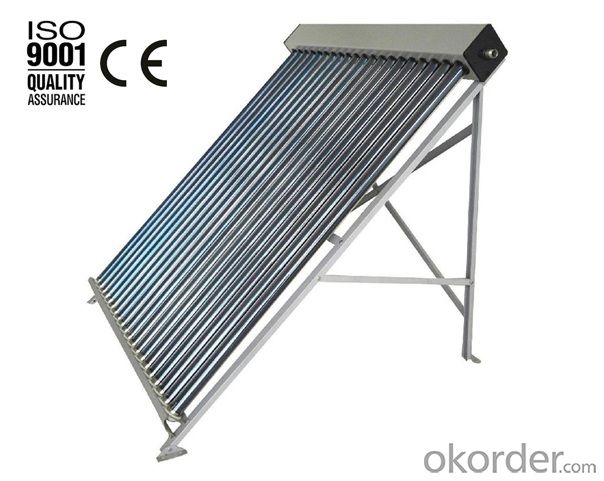
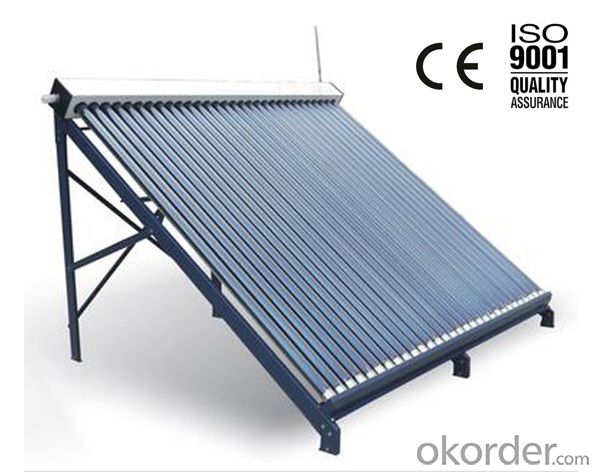
FAQ
1. Q: Are you a factory or trading company?
A: We are a factory. Especially for Solar Controller, PWM solar controller 50A12V/24V
2. Q: Where is your factory located? How can I visit there?
A: Our factory is located in Guangzhou, China. You are warmly welcomed to visit us!
3. Q: what other product you have except such Solar Lighting?
A: We have poly ,mono cells and panels. Off grid solar system, like off grid solar inverter, pure sine wave inverter, solar collector, solar controller, solar charger, Portal solar system, battery, DC Fan, Solar Led Light.
4. Q: Can the price be cheaper?
A: Of course, you will be offered a good discount for big amount.
5. How can I get a sample?
A: Please call us or send email for asking the samples.
- Q: What is the average temperature of water produced by a solar water heater?
- The average temperature of water produced by a solar water heater can vary depending on various factors such as the intensity of sunlight, geographic location, system design, and time of year. However, on average, solar water heaters can heat water to temperatures ranging from 120 to 150 degrees Fahrenheit (49 to 66 degrees Celsius).
- Q: How does the reliability of a solar water heater compare to a traditional water heating system?
- The reliability of a solar water heater is generally comparable to that of a traditional water heating system. Both systems are designed to provide consistent hot water, but there are a few factors to consider. Solar water heaters rely on sunlight to heat the water, so their reliability may be affected by weather conditions and the availability of sunlight. However, solar water heaters are built with backup systems, such as electric or gas heating elements, to ensure hot water supply even during cloudy days. On the other hand, traditional water heating systems may be susceptible to mechanical issues or fuel supply interruptions. Overall, with proper maintenance and backup systems in place, both solar water heaters and traditional systems can offer reliable hot water supply.
- Q: What is the difference between a solar water heater and a solar panel?
- A solar water heater is specifically designed to heat water using solar energy, whereas a solar panel is used to convert sunlight into electricity.
- Q: Can a solar water heater be used in areas with limited access to water conservation measures?
- Yes, a solar water heater can still be used in areas with limited access to water conservation measures. While water conservation measures are beneficial for minimizing overall water usage, a solar water heater primarily relies on capturing and utilizing solar energy to heat water. Therefore, as long as there is an adequate supply of water available, a solar water heater can still be effectively used in such areas to reduce dependency on conventional energy sources and lower energy costs.
- Q: How does the carbon footprint of a solar water heater compare to a traditional water heating system?
- A solar water heater typically has a significantly lower carbon footprint compared to a traditional water heating system. While traditional systems rely on fossil fuels like natural gas or electricity generated from coal, solar water heaters utilize renewable energy from the sun, resulting in reduced greenhouse gas emissions. This makes solar water heaters a more environmentally friendly option for heating water.
- Q: Solar water heater vacuum tube length?
- Solar energy is a clean and free energy, and now the technology of solar energy is very mature
- Q: Can a solar water heater be used in conjunction with a water filtration system?
- Yes, a solar water heater can be used in conjunction with a water filtration system. The solar water heater can heat the water, and then it can be passed through the water filtration system to remove impurities, ensuring clean and hot water for use.
- Q: What is the expected performance of a solar water heater in different weather conditions?
- The expected performance of a solar water heater can vary in different weather conditions. In sunny and clear weather, the heater will perform at its optimal efficiency, heating water quickly and effectively. However, during cloudy or overcast weather, the performance may be reduced as the amount of solar radiation reaching the heater is lower. Additionally, in colder climates or during winter months, the heater may need to work harder to heat the water to the desired temperature. Overall, the performance of a solar water heater is directly influenced by the availability and intensity of sunlight.
- Q: Can a solar water heater be used in areas with limited sunlight during certain seasons?
- Yes, a solar water heater can still be used in areas with limited sunlight during certain seasons. While the efficiency of the solar water heater may decrease in areas with less sunlight, it can still provide some level of heating. Additionally, the system can be designed with backup heating sources, such as electric or gas heaters, to ensure a continuous supply of hot water during periods of limited sunlight.
- Q: What is the impact of water hardness on the performance of a solar water heater?
- The impact of water hardness on the performance of a solar water heater can be substantial. Hard water contains high levels of minerals, primarily calcium and magnesium ions, which can form deposits on the surface of the solar collector and within the piping system. These mineral deposits can reduce the efficiency of the system by inhibiting the transfer of heat from the sun to the water. Additionally, the deposits can clog the piping, causing flow restrictions and potentially damaging the solar water heater components. Regular maintenance and water softening methods may be necessary to mitigate the negative effects of water hardness on the performance of a solar water heater.
Send your message to us
150L Passive Solar Water Heater - Stainless Steel Solar Powered
- Loading Port:
- China main port
- Payment Terms:
- TT OR LC
- Min Order Qty:
- 10 set
- Supply Capability:
- 5000 set/month
OKorder Service Pledge
OKorder Financial Service
Similar products
Hot products
Hot Searches
Related keywords
